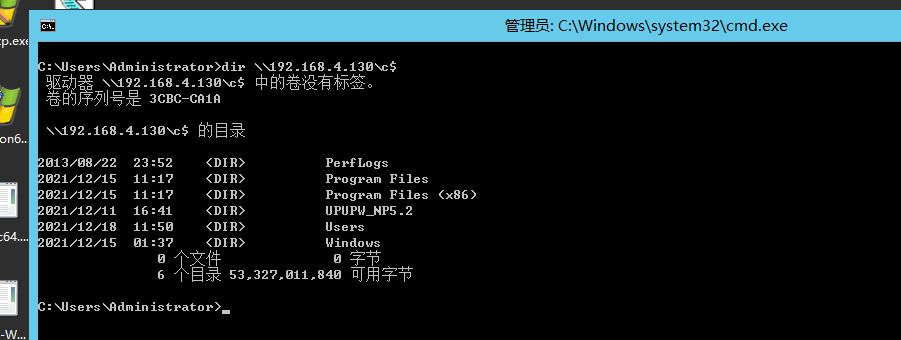关于域普通用户权限中寻找域中域管登陆记录的问题及解决
前言:作为普通域用户如何进行定位域用户登录的笔记
看了很多篇都说啥脚本可以直接来定位高权限的登录记录,我都试了其实发现都是不行的,作为普通域用户根本没有权限来进行相关的查询。
注册表
最后折中的办法,因为这种方法在PC系统是无法查询的!
import re
import sys
import os
abs_path = os.getcwd() + os.path.sep
content_regexp = "\s+" # 多个空格进行字符串拆分到数组
# 首先把net group "Domain Computers" /domain得到的域机器名字放在computer.txt文本中
with open(abs_path + "computer.txt", 'r') as f:
content = f.read()
computer_content_array = re.split(content_regexp, content)
for computer in computer_content_array:
#这个是批量跑每个机器上的登陆情况的
print("reg query \\\\" + computer[:-1] + "\\HKEY_USERS")
PsLoggedon
原理跟上面的一样还是通过注册表来进行查询共享会话
通过工具PsLoggedon64能够实现查询注册表来进行定位,所以以后可以使用这个来进行高权限会话的定位。
https://docs.microsoft.com/en-us/sysinternals/downloads/psloggedon
sloggedon.exe [-] [-l] [-x] [\\computername|username]
- 显示支持的选项和用于输出值的单位。
-l 仅显示本地登录,不显示本地和网络资源登录。
-x 不显示登录时间。
域控机器上进行 dir \\WIN-SKE-PC\c$

WIN-SKE-PC 机器上进行PsLoggedon64查询如下

代码实现
// ConsoleApplication28.cpp : 此文件包含 "main" 函数。程序执行将在此处开始并结束。
//
#include <iostream>
// ConsoleApplication25.cpp : 此文件包含 "main" 函数。程序执行将在此处开始并结束。
//
#include <iostream>
#ifndef UNICODE
#define UNICODE
#endif
#pragma comment(lib, "Netapi32.lib")
#pragma warning(disable:4996)
#include <stdio.h>
#include <assert.h>
#include <windows.h>
#include <lm.h>
#include <ctime>
int session_enum(LPTSTR pszServerName) {
NET_API_STATUS nStatus;
LPSESSION_INFO_10 pBuf = NULL;
LPSESSION_INFO_10 pTmpBuf;
DWORD dwLevel = 10;
DWORD dwPrefMaxLen = MAX_PREFERRED_LENGTH;
DWORD dwEntriesRead = 0;
DWORD dwTotalEntries = 0;
DWORD dwResumeHandle = 0;
DWORD i;
DWORD dwTotalCount = 0;
//LPTSTR pszServerName = NULL;
do // begin do
{
nStatus = NetSessionEnum(pszServerName,
NULL,
NULL,
dwLevel,
(LPBYTE*)&pBuf,
dwPrefMaxLen,
&dwEntriesRead,
&dwTotalEntries,
&dwResumeHandle);
//
// If the call succeeds,
//
if ((nStatus == NERR_Success) || (nStatus == ERROR_MORE_DATA))
{
if ((pTmpBuf = pBuf) != NULL)
{
//
// Loop through the entries.
//
for (i = 0; (i < dwEntriesRead); i++)
{
assert(pTmpBuf != NULL);
if (pTmpBuf == NULL)
{
fprintf(stderr, "An access violation has occurred\n");
break;
}
//
// Print the retrieved data.
//
//sprintf(url, "%ws -> %ws\n", pTmpBuf->sesi10_cname,pTmpBuf->sesi10_username);
SYSTEMTIME sys;
GetLocalTime(&sys);
char current_time[64] = { NULL };
sprintf(current_time, "%4d-%02d-%02d %02d:%02d:%02d ", sys.wYear, sys.wMonth, sys.wDay, sys.wHour, sys.wMinute, sys.wSecond);
printf("[%s] [%ws] [%ws] [%ws]\n", current_time, pszServerName, pTmpBuf->sesi10_cname, pTmpBuf->sesi10_username);
/*
wprintf(L"\n\tClient: %s\n", pTmpBuf->sesi10_cname);
wprintf(L"\tUser: %s\n", pTmpBuf->sesi10_username);
printf("\tActive: %d\n", pTmpBuf->sesi10_time);
printf("\tIdle: %d\n", pTmpBuf->sesi10_idle_time);
*/
pTmpBuf++;
dwTotalCount++;
}
}
}
//
// Otherwise, indicate a system error.
//
else
fprintf(stderr, "A system error has occurred: %d\n", nStatus);
//
// Free the allocated memory.
//
if (pBuf != NULL)
{
NetApiBufferFree(pBuf);
pBuf = NULL;
}
}
//
// Continue to call NetSessionEnum while
// there are more entries.
//
while (nStatus == ERROR_MORE_DATA); // end do
// Check again for an allocated buffer.
//
if (pBuf != NULL)
NetApiBufferFree(pBuf);
return 0;
}
int wmain(int argc, wchar_t* argv[])
{
//
// Check command line arguments.
//
if (argc == 1) {
printf("\nUsing:\n\t session_enum.exe \\\\dc1 \\\\dc2 \n");
return 0;
}
while (true)
{
for (size_t i = 0; i < argc; i++)
{
if (i == 0) {
continue;
}
//printf("%ws\n",argv[i]);
session_enum(argv[i]);
}
Sleep(5000);
}
return 0;
}



 浙公网安备 33010602011771号
浙公网安备 33010602011771号